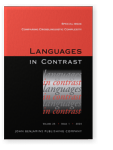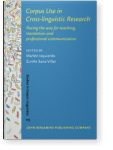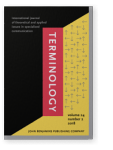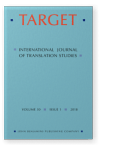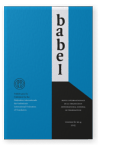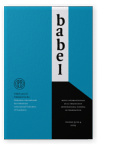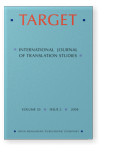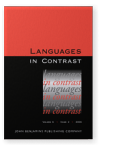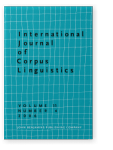Noelia Ramón García
List of John Benjamins publications for which Noelia Ramón García plays a role.
2024 The Spanish subjunctive mood and its English correspondences: A case for complexity across languages Comparing Crosslinguistic Complexity, Ström Herold, Jenny and Magnus Levin (eds.), pp. 33–56 | Article
Corpus-based contrastive studies have successfully addressed the empirical study of crosslinguistic similarities and differences and may also contribute to understanding complexity across languages. This paper aims at (dis)proving whether the Spanish subjunctive mood shows greater complexity… read more
2023 Chapter 5. Exploring near-synonyms through translation corpora: A case study on ‘begin’ and ‘start’ in the English-Spanish parallel corpus PACTRES Corpus Use in Cross-linguistic Research: Paving the way for teaching, translation and professional communication, Izquierdo, Marlén and Zuriñe Sanz-Villar (eds.), pp. 91–107 | Chapter
This chapter explores the Spanish translations of the English ingressive verbs ‘begin’ and ‘start’ in the parallel corpus PACTRES. ‘Begin’ and ‘start’ are considered near-synonyms and the aim of this paper is to trace any semantic differences between them through an analysis of their Spanish… read more
2018 Selling cheese online: Key nouns in cheese descriptions Terminology 24:2, pp. 210–235 | Article
This paper is a corpus-based study of certain key nouns used in promotional texts describing cheese in English. A corpus of online cheese descriptions was compiled to extract lexical information regarding the characterization of cheese. All in all, 37 key nouns were identified and classified… read more
2018 Translation description for assessment and post-editing: The case of personal pronouns in translated Spanish Target 30:1, pp. 112–136 | Article
This paper presents a corpus-based descriptive research procedure for the identification of significant divergences between original Spanish and Spanish translated from English. When considering the language pair English-Spanish, personal pronouns seem to be good markers of significant… read more
2015 Comparing original and translated Spanish: A corpus-based analysis of adjective position Babel 61:4, pp. 527–551 | Article
It is a well-known fact that translated texts present a number of peculiarities which distinguish its language from the one found in texts produced originally. Many studies have tried to name some of these phenomena, which are usually grouped together under the umbrella term of ‘translation… read more
2009 Corpus-based contrastive analysis and translation universals: A tool for translation quality assessment English --> Spanish Babel 55:4, pp. 303–328 | Article
Project) developed at the University of León (Spain) for identifying instances of low-quality rendering of grammatical features when translating from English into Spanish using translation universals. The analysis provides information about: i) the resources available (or absence thereof) in each… read more
2008 Translations of ‘-ly’ adverbs of degree in an English-Spanish Parallel Corpus Target 20:2, pp. 275–296 | Article
This paper focuses on the translations of English -ly adverbs of degree into Spanish. The English suffix -ly has been traditionally associated with the expression of manner. However, it also actualises other meanings, in particular degree. In Spanish, the formal equivalents of -ly adverbs are… read more
2006 Mapping meaning onto form: A corpus-based contrastive study of nominal modification in English and Spanish Languages in Contrast 6:2, pp. 307–334 | Article
This paper is a corpus-based contrastive study of one particular semantic area — the modification of nouns — and the grammatical structures available in English and Spanish to actualize this particular meaning within the scope of the NP. Two large monolingual reference corpora, one in each… read more
2006 Multiple modification in English and Spanish NPs International Journal of Corpus Linguistics 11:4, pp. 463–495 | Article
This paper is an English-Spanish corpus-based contrastive study of multiple modification within the boundaries of the noun phrase. This issue is particularly problematic when comparing English and Spanish, and causes difficulties in foreign language learning as well as in translation processes… read more
